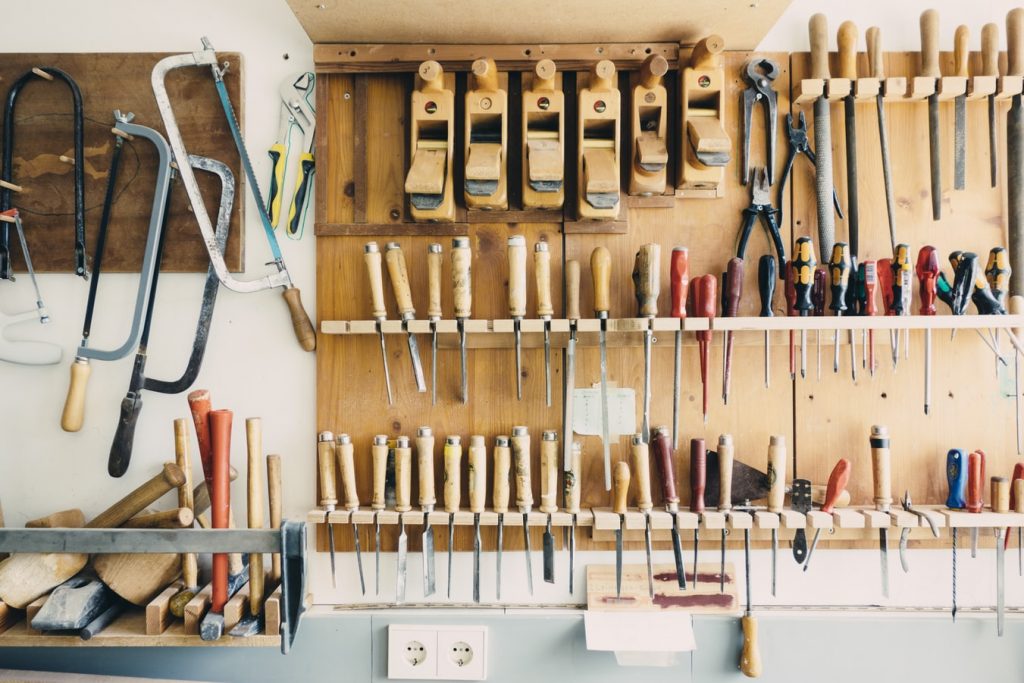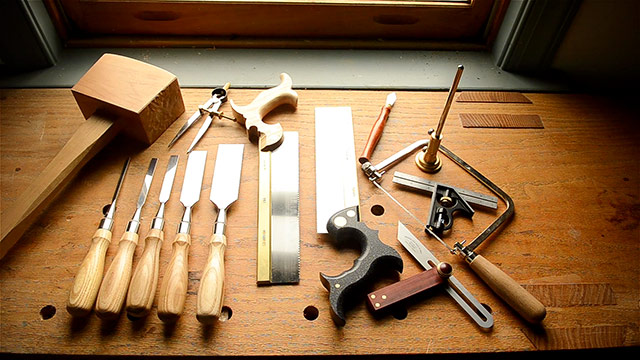Are you wondering what order you should buy woodworking tools in? Well, look no further! Whether you’re a budding carpenter or just starting out with your woodworking hobby, figuring out which tools to get first can be a bit overwhelming. But fear not, because I’m here to guide you through the process.
Now, you might be thinking, “Why does the order matter? Can’t I just buy whatever tools I want?” While it’s true that you can choose your tools as you please, there’s actually a logical sequence that can help you make the most of your woodworking journey. Think of it like building a house – you wouldn’t start with the roof before the foundation, right?
So, let’s dive in and explore the optimal order for buying woodworking tools. By following this recommended sequence, you’ll be well-equipped to tackle various projects and build your skills along the way. Ready to get started? Let’s go!
Planning your woodworking tool purchases is crucial for a smooth start. Begin with the essential hand tools like chisels, saws, and planes. Next, invest in power tools such as a drill, jigsaw, and sander. As you gain experience, expand your collection with specialized tools like a router and a table saw. Gradually building your tool arsenal in this order will ensure you have what you need for various woodworking projects.

The Best Order to Buy Woodworking Tools: A Guide for Beginners
Woodworking is a rewarding hobby that allows you to create beautiful and functional pieces from scratch. However, getting started can be overwhelming, especially when it comes to choosing the right tools. In this guide, we will help you navigate the world of woodworking tools and determine the best order in which to purchase them. Whether you’re a beginner or looking to expand your collection, this article will provide you with valuable insights and tips to make informed decisions.
Building Your Woodworking Toolkit: Essential Tools for Beginners
Choosing the right woodworking tools is crucial for a successful woodworking journey. While it’s tempting to buy every tool you come across, it’s important to start with the essentials. Here are three key tools to kickstart your woodworking toolkit:
1. A Reliable Circular Saw
A circular saw is a versatile tool that can handle a variety of cutting tasks. It allows you to make straight cuts with ease, making it an essential tool for any woodworker. When selecting a circular saw, opt for one with a higher amp rating for increased power and choose a blade with the appropriate number of teeth for the type of cuts you plan to make.
2. A Drill
A drill is another must-have tool for woodworking. It serves a multitude of purposes, from drilling holes to driving screws. Look for a cordless drill that offers both power and versatility. Consider investing in a drill with multiple speed settings and a clutch for adjustable torque control.
3. A Random Orbital Sander
A random orbital sander is essential for achieving smooth and flawless finishes on your woodworking projects. It removes material quickly and evenly, preventing the occurrence of swirl marks on the surface. When choosing a random orbital sander, look for ones with variable speed settings and a dust collection system for cleaner and more efficient sanding.
Expanding Your Woodworking Toolkit: Intermediate Tools
Once you have acquired the essential tools for woodworking, it’s time to expand your collection and tackle more complex projects. Here are three intermediate tools that will allow you to elevate your woodworking skills:
1. A Router
A router is a versatile tool that opens up a world of possibilities in woodworking. It allows you to create intricate designs, shape edges, and hollow out grooves. Choose a router that offers both fixed and plunge bases, as this will provide you with more flexibility and versatility in your projects.
2. A Compound Miter Saw
A compound miter saw is a game-changer when it comes to making precise angled cuts. It allows you to make compound cuts, such as bevels and miters, effortlessly. Look for a compound miter saw with a high-quality blade, adjustable miter and bevel angles, and a laser guide for increased accuracy.
3. A Chisel Set
Chisels are essential hand tools that allow you to carve, shape, and refine your woodworking projects. Invest in a good-quality chisel set that includes different sizes and types of chisels, such as bench chisels and mortise chisels. Ensure that the chisels are sharp and well-maintained for optimal performance.
Specialized Tools for Advanced Woodworkers
If you’ve mastered the basics of woodworking and are ready to take on more challenging projects, adding specialized tools to your collection will elevate your craftsmanship. Here are three specialized tools that advanced woodworkers often find invaluable:
1. A Planer
A planer is a powerful tool that allows you to achieve precise thickness and smoothness on rough lumber. It’s particularly useful when working with hardwoods that require accurate dimensions. Look for a planer with a robust motor, adjustable depth settings, and a dust collection system for efficient chip disposal.
2. A Bandsaw
A bandsaw is a versatile tool that offers intricate precision cuts and curves. It’s ideal for resawing, creating veneers, and cutting irregular shapes. When selecting a bandsaw, consider the throat capacity, blade size, and motor power to ensure it meets your project requirements.
3. A Lathe
A lathe is a tool commonly used by woodturners to create symmetrical and cylindrical shapes. It allows you to turn wooden blanks into bowls, vases, and spindle-shaped objects. Look for a lathe with adjustable speed settings, a sturdy construction, and a reliable motor for smooth and precise turning.
In conclusion, building a woodworking toolkit is a journey, and it’s important to start with the essentials before expanding your collection. Begin with a reliable circular saw, a drill, and a random orbital sander to tackle basic projects. As your skills grow, gradually invest in intermediate tools such as a router, a compound miter saw, and a chisel set. If you’re an experienced woodworker, specialized tools like a planer, a bandsaw, and a lathe will provide you with the means to take your craft to new heights. Remember to prioritize quality when purchasing tools, as they will greatly impact the outcome of your woodworking projects. Happy woodworking!
Key Takeaways: What Order Should I Buy Woodworking Tools?
- Start with essential hand tools like a chisel, mallet, and hand saw.
- Next, invest in a good quality power drill for drilling holes and driving screws.
- Consider getting a basic set of measuring and layout tools, such as a tape measure and combination square.
- Add a table saw to your collection for accurate straight cuts.
- Finally, expand your toolkit with specialty tools based on the specific woodworking projects you plan to take on.
Frequently Asked Questions
What are the essential woodworking tools I should buy first?
When starting in woodworking, it’s important to have a few key tools to get you started. The essentials include a good quality handsaw for cutting wood, a measuring tape for accurate measurements, a set of chisels for shaping and carving, a hammer for driving nails, and a set of screwdrivers for assembling projects. These tools will cover the basics, allowing you to tackle a wide range of woodworking projects with ease.
As you gain experience and take on more advanced projects, you can gradually add to your tool collection. Remember to invest in high-quality tools that will last, rather than settling for cheaper options that may break or not perform as well.
Should I prioritize power tools or hand tools when starting out?
When you’re just starting out, it’s generally recommended to prioritize hand tools over power tools. Hand tools provide a better understanding of woodworking techniques and allow you to develop your skills without relying solely on the power of machinery. They also tend to be more affordable and require less maintenance compared to power tools.
As you gain experience and take on larger or more complex projects, power tools can be a valuable addition to your workshop. However, it’s still important to have a solid foundation in hand tool usage, as they often come in handy for intricate work or when power is unavailable.
What factors should I consider when buying woodworking tools?
When purchasing woodworking tools, there are a few factors to consider. First, consider the quality of the tool. Investing in well-made tools will ensure their durability and performance, saving you money in the long run. Additionally, consider the specific needs of your projects and the types of woodworking you plan to do. Different tools excel in different applications, so choose ones that align with your intended usage.
It’s also important to consider your budget. Woodworking tools can range in price, so determine how much you’re willing to invest and prioritize the most essential tools first. Finally, do your research and read reviews to ensure you’re purchasing from reputable brands and obtaining reliable tools that will serve you well in your woodworking journey.
Can I buy used woodworking tools or should I stick with new ones?
Buying used woodworking tools can be a great way to save money, especially if you’re just starting out. However, there are a few things to keep in mind. Inspect the tools carefully for any damage or signs of excessive wear. Make sure they are still in good working condition and that any necessary repairs are within your skill level or budget.
Additionally, research the market value of the specific tool you’re interested in to ensure you’re getting a fair price. If the price is too good to be true, it may be an indication of poor quality or a scam. Ultimately, it’s a personal choice whether to buy used or new tools, but make sure to do your due diligence before making a purchase.
Are there any safety considerations when buying woodworking tools?
Safety should always be a top priority when working with woodworking tools. When purchasing tools, ensure they have appropriate safety features, such as blade guards or safety switches. Familiarize yourself with the proper usage and safety guidelines for each tool, and always wear the necessary personal protective equipment, such as safety goggles, gloves, and ear protection.
Furthermore, consider the space in which you’ll be working. Ensure you have adequate ventilation, proper lighting, and a clean, clutter-free environment to prevent accidents. Finally, invest in a good quality first aid kit and familiarize yourself with basic first aid procedures to be prepared for any accidents that may occur while working with tools.

What Order should i Buy Woodworking Tools ? ( timeless & helpful Tips ) .
Summary:
When it comes to buying woodworking tools, it’s important to start with the basics and gradually add more tools based on your needs and budget. First, invest in essential tools like a tape measure, hammer, screwdriver, and level. Then, move on to versatile tools like a circular saw, jigsaw, and power drill. As you gain more experience, you can consider purchasing specialized tools like a table saw, router, and miter saw. Remember to prioritize safety by getting protective gear such as safety glasses and ear protection. Take your time, do your research, and build your collection gradually.
Key Takeaways:
1. Start with basic tools like a tape measure, hammer, screwdriver, and level.
2. Gradually add versatile tools like a circular saw, jigsaw, and power drill.
3. Consider specialized tools like a table saw, router, and miter saw as you gain experience.
4. Prioritize safety by investing in protective gear such as safety glasses and ear protection.
5. Take your time, do your research, and build your collection gradually.
